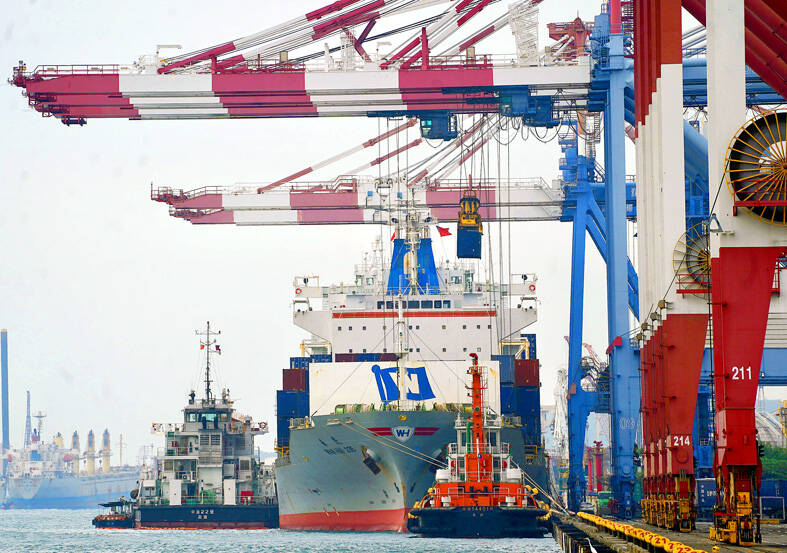Exports last month slumped 13.1 percent year-on-year to a 19-month low of US$36.13 billion, as demand for all product categories dwindled in almost all markets, especially in China, the Ministry of Finance said yesterday.
The decline was the fastest in seven years, with China contributing 66 percent, as escalating COVID-19 infections weighed on sales of smartphones and other consumer electronics, the ministry said.
“The retreat this quarter turned out worse than expected and might far miss the recent forecast by the Directorate-General of Budget, Accounting and Statistics,” Department of Statistics Director-General Beatrice Tsai (蔡美娜) said.

Photo: CNA
The agency is looking at a 3.9 percent fall in exports this quarter, but the actual decline would double to 7 percent, Tsai said, adding that tepid sales spread to high-tech sectors without signs of improvement any time soon.
Persistent inflation and drastic monetary tightening, as well as China’s strict COVD-19 restrictions, dashed hopes of a business rebound boosted by Double 11 Singles’ Day in China and Christmas sales in the West, she said.
That explained why Apple Inc had slashed its iPhone sales forecast for this year, Tsai added.
Exports this month might tumble 8 to 12 percent, she said.
Shipments of electronic components shrank 4.9 percent, with chip sales falling 3.4 percent, ending nearly three years of expansions, the ministry’s monthly report showed.
Exports of optical devices, mainly flat panels and camera lenses, remained the weakest, with a 31.9 percent decrease from a year earlier, Tsai said, adding that smartphone camera lens supplier Largan Precision Co (大立光) expects lackluster business for this month.
Exports to China, including Hong Kong, plunged 20.9 percent, erasing gains in the first 10 months of this year, and might further decline this month, Tsai said.
Shipments to other destinations were similarly soft, with an 11.3 percent decrease to the US, a 19 percent drop to Europe and a 4.5 percent retreat to Southeast Asia, she said.
Japan proved the exception with a 15 percent gain, thanks to robust demand for electronics, the report said.
A weak New Taiwan dollar against the US dollar also weighed on exports, Tsai said.
Imports fell 8.6 percent to US$32.7 billion, giving Taiwan a trade surplus of US$3.43 billion, down 40.6 percent from a year earlier, the ministry said.
Imports of agricultural and industrial raw materials shed 15.3 percent, as local firms cut capacity to cope with a business slowdown and facilitate inventory adjustments, it said.
Imports of capital equipment held strong with an 11.7 percent pickup, as semiconductor firms pressed ahead with technology upgrades, it said.
In the first 11 months, exports expanded 9.4 percent to US$443.78 billion, while imports advanced 14.3 percent to US$396.63 billion, it said.
Exports are expected to set a record for the full year, but the outlook for the next couple of months is bleak, Tsai said.

UNCERTAINTY: Innolux activated a stringent supply chain management mechanism, as it did during the COVID-19 pandemic, to ensure optimal inventory levels for customers Flat-panel display makers AUO Corp (友達) and Innolux Corp (群創) yesterday said that about 12 to 20 percent of their display business is at risk of potential US tariffs and that they would relocate production or shipment destinations to mitigate the levies’ effects. US tariffs would have a direct impact of US$200 million on AUO’s revenue, company chairman Paul Peng (彭雙浪) told reporters on the sidelines of the Touch Taiwan trade show in Taipei yesterday. That would make up about 12 percent of the company’s overall revenue. To cope with the tariff uncertainty, AUO plans to allocate its production to manufacturing facilities in

Taiwan will prioritize the development of silicon photonics by taking advantage of its strength in the semiconductor industry to build another shield to protect the local economy, National Development Council (NDC) Minister Paul Liu (劉鏡清) said yesterday. Speaking at a meeting of the legislature’s Economics Committee, Liu said Taiwan already has the artificial intelligence (AI) industry as a shield, after the semiconductor industry, to safeguard the country, and is looking at new unique fields to build more economic shields. While Taiwan will further strengthen its existing shields, over the longer term, the country is determined to focus on such potential segments as

TAKING STOCK: A Taiwanese cookware firm in Vietnam urged customers to assess inventory or place orders early so shipments can reach the US while tariffs are paused Taiwanese businesses in Vietnam are exploring alternatives after the White House imposed a 46 percent import duty on Vietnamese goods, following US President Donald Trump’s announcement of “reciprocal” tariffs on the US’ trading partners. Lo Shih-liang (羅世良), chairman of Brico Industry Co (裕茂工業), a Taiwanese company that manufactures cast iron cookware and stove components in Vietnam, said that more than 40 percent of his business was tied to the US market, describing the constant US policy shifts as an emotional roller coaster. “I work during the day and stay up all night watching the news. I’ve been following US news until 3am

COLLABORATION: Given Taiwan’s key position in global supply chains, the US firm is discussing strategies with local partners and clients to deal with global uncertainties Advanced Micro Devices Inc (AMD) yesterday said it is meeting with local ecosystem partners, including Taiwan Semiconductor Manufacturing Co (TSMC, 台積電), to discuss strategies, including long-term manufacturing, to navigate uncertainties such as US tariffs, as Taiwan occupies an important position in global supply chains. AMD chief executive officer Lisa Su (蘇姿丰) told reporters that Taiwan is an important part of the chip designer’s ecosystem and she is discussing with partners and customers in Taiwan to forge strong collaborations on different areas during this critical period. AMD has just become the first artificial-intelligence (AI) server chip customer of TSMC to utilize its advanced